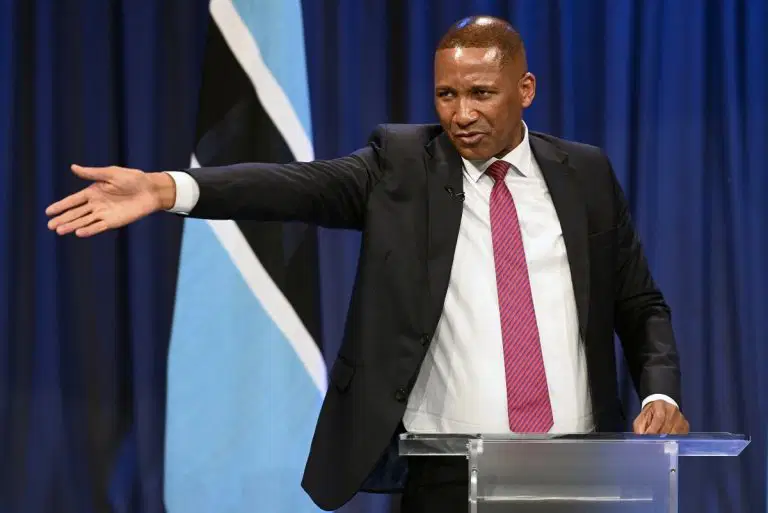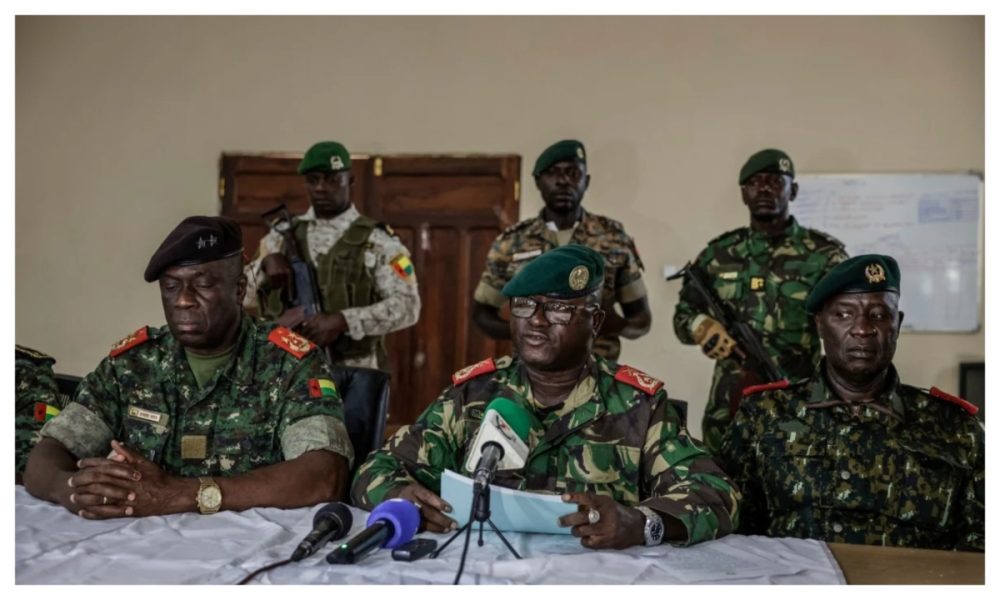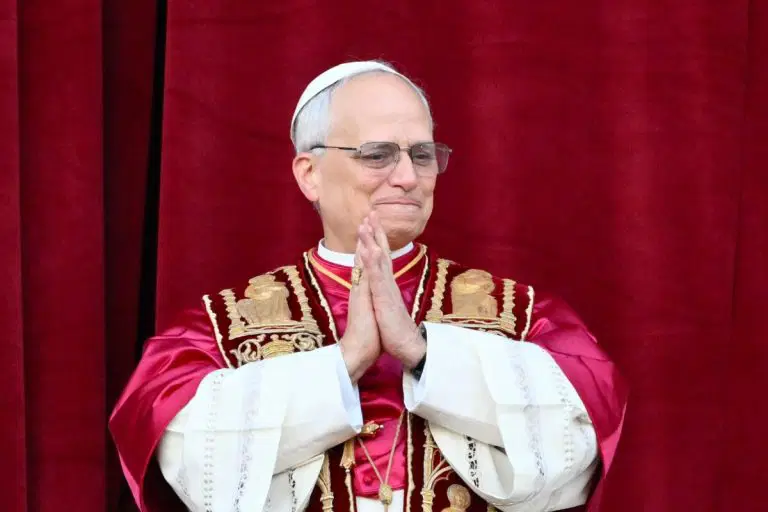Headline
Botswana’s New President Sworn In As Voters Kick Out Ruling Party Of Nearly Six Decades

Botswana’s new president took office Friday in a whirlwind transfer of power following elections that saw a historic defeat handed to the party that had governed the diamond-rich country for nearly 60 years.
Human rights lawyer Duma Boko, 54, was sworn in during a closed session at the office of the chief justice three days after elections which booted the Botswana Democratic Party (BDP) out of office.
Boko later delivered an acceptance speech and press briefing that was broadcast live on state television and touched on some of his campaign pledges, such as more than doubling the minimum wage to 4,000 pula ($300) and introducing universal health insurance.
The president said he wanted to secure investor confidence as well as ties with mining companies active in Botswana while exploring ways to diversify the diamond-dependent economy, a measure seen as critical to stabilising the country’s finances.
READ ALSO: LIST: Billionaires, Celebrities Endorsing Donald Trump, Kamala Harris
A public inauguration ceremony would be held in due course, he said. The presidency is “a responsibility one approaches and accepts with humility, with some trepidation and feeling. I dare not fail. I dare not disappoint.”
Outgoing president Mokgweetsi Masisi conceded defeat earlier in the day after overnight results from Wednesday’s general election showed that his party — in power since independence from Britain in 1966 — would not win enough seats in parliament to be able to form a government.
– ‘Higher democracy’ –
Boko, who has spent three decades in opposition politics fighting to dislodge the BDP, praised the peaceful handover as an example of democracy in action.
“What has happened today takes our democracy to a higher level,” he told the independent Mmegi newspaper.
“It now means we have seen a successful, peaceful, orderly democratic transition from one regime to the next and this happened in full view of every citizen of this country with their full participation and endorsement.”
READ ALSO: NAFDAC Warns Nigerians Against Use Of Recalled Nivea Roll-on Deodorant
The BDP’s defeat was a major blow for Masisi, 63, who was elected in 2018 and had been confident of securing a second term.
“We got it wrong big time in the eyes of the people,” Masisi conceded.
“We were really convinced of our message. But every indication, by any measure, is that there’s no way that I can pretend that we’re going to form a government.”
“I will respectfully step aside and participate in a smooth and transparent transition process ahead of inauguration,” he said.
A key concern for voters was unemployment which has risen to 27 percent this year and a slump in the economy due in part to weakened diamond sales, Botswana’s single biggest revenue earner.
READ ALSO:
Growth is projected to slow to one percent this year.
There have also been allegations of corruption, nepotism and mismanagement by Masisi’s government, while the gap between the rich and poor is one of the largest in the world, according to the World Bank.
– ‘New dawn’ –
It was the third run at the presidency for the self-confident and ambitious Boko, who established the UDC in 2012 to unite opposition groups against the bulwark of the BDP.
“CHANGE IS HERE,” he wrote on Facebook as the alliance’s strong showing became clear, with small street celebrations breaking out in parts of the capital Gaborone early Friday.
“Botswana’s new dawn as Boko, UDC rise,” the Mmegi outlet wrote on Facebook.
“We are expecting more from this new Botswana,” said cleaner, Pelontle Ditshotlo, 41. The BDP had not delivered on its promises and the cost of living is too high, she said.
“When you are in parliament, we need to know that you listen to us, you are with us.”
“For us it’s a big change. It’s a relief,” said Sandy Mlotshwa, 22, a waiter.
“I want to see if the new system that comes in will make a change for us. If not, then we’re going to change it again.”
Headline
Coup: Guinea-Bissau Junta Releases Six Held Opposition Politicians

Guinea-Bissau’s ruling junta on Tuesday released six members of the political opposition who had been detained since a coup last month.
The six freed opposition members are said to be close associates of Domingos Simoes Pereira, head of the PAIGC party that led the country to independence in 1974.
Pereira has been in custody since the coup.
In a statement by the High Military Command, the junta’s governing body, the releases are described as a sign of good faith and a step towards the return to constitutional normality and respect for international rights.
READ ALSO:Why West African Troops Overturned Benin’s Coup But Watched Others Pass
The army seized power on 26 November after ousting outgoing President Umaro Sissoco Embalo in the wake of a presidential vote.
After taking over, the military suspended the electoral process and announced it would take control of the West African country for a period of one year.
Recall that another opposition candidate, Fernando Dias, took refuge in Nigeria’s embassy, which granted him asylum, while Embalo fled the country after being briefly detained by the military at the time of the coup.
Meanwhile, Senegal’s Foreign Minister, Cheikh Niang, led a delegation to Guinea-Bissau, where he met with detained opponents and requested their release.
Headline
7 Territories Still Under Colonial Rule

Even though most nations became independent in the last century, some territories are still ruled by other nations.
Contents
1. Western Sahara
2. Guam
3. American Samoa
4. United States Virgin Islands
5. Falkland Islands / Malvinas
6. Gibraltar
7. Bermuda
Many of them remain on the United Nations list of non-self-governing territories, meaning they have not completed the process of decolonization. These places usually depend on bigger countries for laws, passports, defence, or political control.
In this article, Nigerian Tribune highlights 7 territories still under colonial rule:
READ ALSO:Nigeria Ranks World’s 102nd Happiest Nation, US, Germany Not Among 20 Top Counties
1. Western Sahara
Western Sahara remains one of the world’s biggest unresolved colonial issues. Morocco controls most of the territory, but the Polisario Front wants independence for the Sahrawi people. The UN is still trying to help both sides agree on a peaceful solution.
2. Guam
Guam is an important US territory in the Pacific, used heavily for American military operations. The US oversees its defence and foreign relations.
People living there are US citizens, but they cannot vote in presidential elections and do not have full representation in Congress.
READ ALSO:FULL LIST: US To Review Green Cards From 19 ‘Countries Of Concern’ After Washington Shooting
3. American Samoa
American Samoa has more local control than Guam, but the United States still decides immigration, defence, and foreign affairs.
Residents are considered US nationals and must apply if they want full citizenship.
4. United States Virgin Islands
The US Virgin Islands have their own legislature, but the United States makes major constitutional and political decisions. The territory depends heavily on US federal support.
5. Falkland Islands / Malvinas
The Falkland Islands remain controlled by the United Kingdom (UK), but Argentina has long disputed this claim, having been in control of the Islands for a few years before 1833.
The people living there voted strongly to stay British, yet the sovereignty dispute continues to appear in the UN.
READ ALSO:Six Countries With Highest Number Of Billionaires In 2025
6. Gibraltar
Gibraltar sits at the Southern tip of Spain. The United Kingdom controls it, but Spain insists the territory belongs to them.
Gibraltarians have repeatedly voted in favour of remaining British, but the dispute is still discussed within the UN Decolonisation Committee.
7. Bermuda
Bermuda is a British Overseas Territory situated in the North Atlantic Ocean. Although it manages most of its own internal affairs and enjoys a strong economy with modern facilities, the United Kingdom still handles its defence and represents it in global matters.
Headline
Russia-Ukraine War: Pope Leo Calls For Global Christmas Truce

Pope Leo XIV on Tuesday renewed his call for a global truce on Christmas Day, saying he felt “great sadness” after Russia “apparently rejected a request” for a pause in fighting.
Speaking to reporters at his residence in Castel Gandolfo near Rome, the Pope urged all sides involved in conflict to observe at least one day of peace.
“I am renewing my request to all people of goodwill to respect a day of peace — at least on the feast of the birth of our Saviour,” Leo said.
Recall that Russia invaded Ukraine in February 2022 and has repeatedly turned down calls for a ceasefire, arguing that any pause would give Ukraine a military advantage.
READ ALSO:Russian Strikes Kill Five In Ukraine, Cause Power Outages
“Among the things that cause me great sadness is the fact that Russia has apparently rejected a request for a truce,” the pope said.
Referring to conflicts worldwide, Leo added, “I hope they will listen and there will be 24 hours of peace in the whole world.”
The appeal came as fighting continued in eastern Ukraine. On Tuesday, Ukrainian forces withdrew from a town after heavy battles with Russian troops. Russian strikes killed three civilians and left thousands without power during winter temperatures.
READ ALSO:Trump Blasts Ukraine For ‘Zero Gratitude’ Amid Talks To Halt War
There was no indication of progress toward ending the war after separate meetings last weekend in Miami between the United States officials and negotiators from Russia and Ukraine. The conflict is nearing four years with no settlement in sight.
Earlier this month, Pope Leo met Ukrainian President Volodymyr Zelensky. When asked whether he would accept Zelensky’s invitation to visit Ukraine, the pope said, “I hope so,” while noting that it was not possible to say when such a visit could happen.
Leo also warned that efforts to secure peace without European diplomatic involvement were “unrealistic”, expressing optimism that President Donald Trump’s proposed peace plan could bring a “huge change” to the transatlantic alliance.

 News2 days ago
News2 days agoPHOTOS: New Era In Furupagha-Ebijaw As Okpururu 1 Receives Staff Of Office

 Metro5 days ago
Metro5 days agoJUST IN: Former Edo Information Commissioner Is Dead

 News2 days ago
News2 days agoUBTH CMD Marks 120 Days In Office, Expresses Commitment To Providing Conducive Working Environment

 News2 days ago
News2 days agoFG Declares Public Holidays For Christmas, New Year Celebrations

 News5 days ago
News5 days agoCoordinator, Edo First Lady Office, Majority Leader, Rights Lawyer, Others Bag 2025 Leadership Award

 Metro5 days ago
Metro5 days agoShe Grabs, Pulls My Manhood Anytime We Fight — Husband

 News2 days ago
News2 days agoOPINION: Gumi And His Terrorists

 Metro5 days ago
Metro5 days agoWhy I Charged My Husband Money For Sex —Woman

 News2 days ago
News2 days agoFIRS Confirms NIN As Tax ID

 News2 days ago
News2 days agoOPINION: My Man Of The Season




















